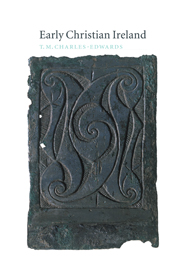Book contents
- Frontmatter
- Contents
- List of maps
- List of tables
- List of figures
- Acknowledgements
- Abbreviations
- A note on pronunciation
- A note on the Chronicle of Ireland
- Introduction
- 1 Ireland in the seventh century: a tour
- 2 Irish society c. 700: I. Communities
- 3 Irish society c. 700: II Social distinctions and moral values
- 4 Ireland and Rome
- 5 Conversion to Christianity
- 6 The organisation of the early Irish Church
- 7 Columba, Iona and Lindisfarne
- 8 Columbanus and his disciples
- 9 The Paschal controversy
- 10 The primatial claims of Armagh, Kildare and Canterbury
- 11 The origins and rise of the Uí Néill
- 12 The kingship of Tara
- 13 The powers of kings
- 14 Conclusion
- Appendix: genealogies and king-lists
- Glossary: Irish and Latin
- Bibliography
- Index
12 - The kingship of Tara
Published online by Cambridge University Press: 11 September 2009
- Frontmatter
- Contents
- List of maps
- List of tables
- List of figures
- Acknowledgements
- Abbreviations
- A note on pronunciation
- A note on the Chronicle of Ireland
- Introduction
- 1 Ireland in the seventh century: a tour
- 2 Irish society c. 700: I. Communities
- 3 Irish society c. 700: II Social distinctions and moral values
- 4 Ireland and Rome
- 5 Conversion to Christianity
- 6 The organisation of the early Irish Church
- 7 Columba, Iona and Lindisfarne
- 8 Columbanus and his disciples
- 9 The Paschal controversy
- 10 The primatial claims of Armagh, Kildare and Canterbury
- 11 The origins and rise of the Uí Néill
- 12 The kingship of Tara
- 13 The powers of kings
- 14 Conclusion
- Appendix: genealogies and king-lists
- Glossary: Irish and Latin
- Bibliography
- Index
Summary
About 800 Óengus mac Óengobann, Óengus the Culdee, contrasted thepresent glories of the great churches with the empty silence in the formerfortresses of Ireland:
The burdensome fortress of Tara perished with the fall of her princes;
with a full complement of venerable champions
great Armagh endures.
The Faith has grown;
it will endure till the Day of Judgement;
guilty pagans are carried off;
their forts are not inhabited.
The Fort of Crúachain has vanished
together with Ailill, offspring of victory;
fair is the dignity, superior to princes,
which dwells in the seat of Clonmacnois.
Óengus identified Tara, Crúachain (also Crúachu) and the rest as pagan sites and as royal fortresses. His poem is a valuable demonstration of one way in which the opposition between the past and the present, between paganism and Christianity, could be combined with a further contrast, between military might and spiritual power. His contemporary point is
driven home a few stanzas later, when he refers to the king of Tara, Donnchad mac Domnaill of Cland Cholmáin, to his brother-in-law, Bran, king of Leinster (both of whom had just died), and to Máel Rúain, the saintly abbot of Tallaght:
Donnchad, wrathful, red, chosen,
or victorious Bran of the Barrow:
visiting their tombs
does not rid me of the trouble of weakness.
Máel Rúain, after reverent service,
the great sun to the south of the plain of Mide:
at his grave with purity
is healed every heart's sigh.
- Type
- Chapter
- Information
- Early Christian Ireland , pp. 469 - 521Publisher: Cambridge University PressPrint publication year: 2000



